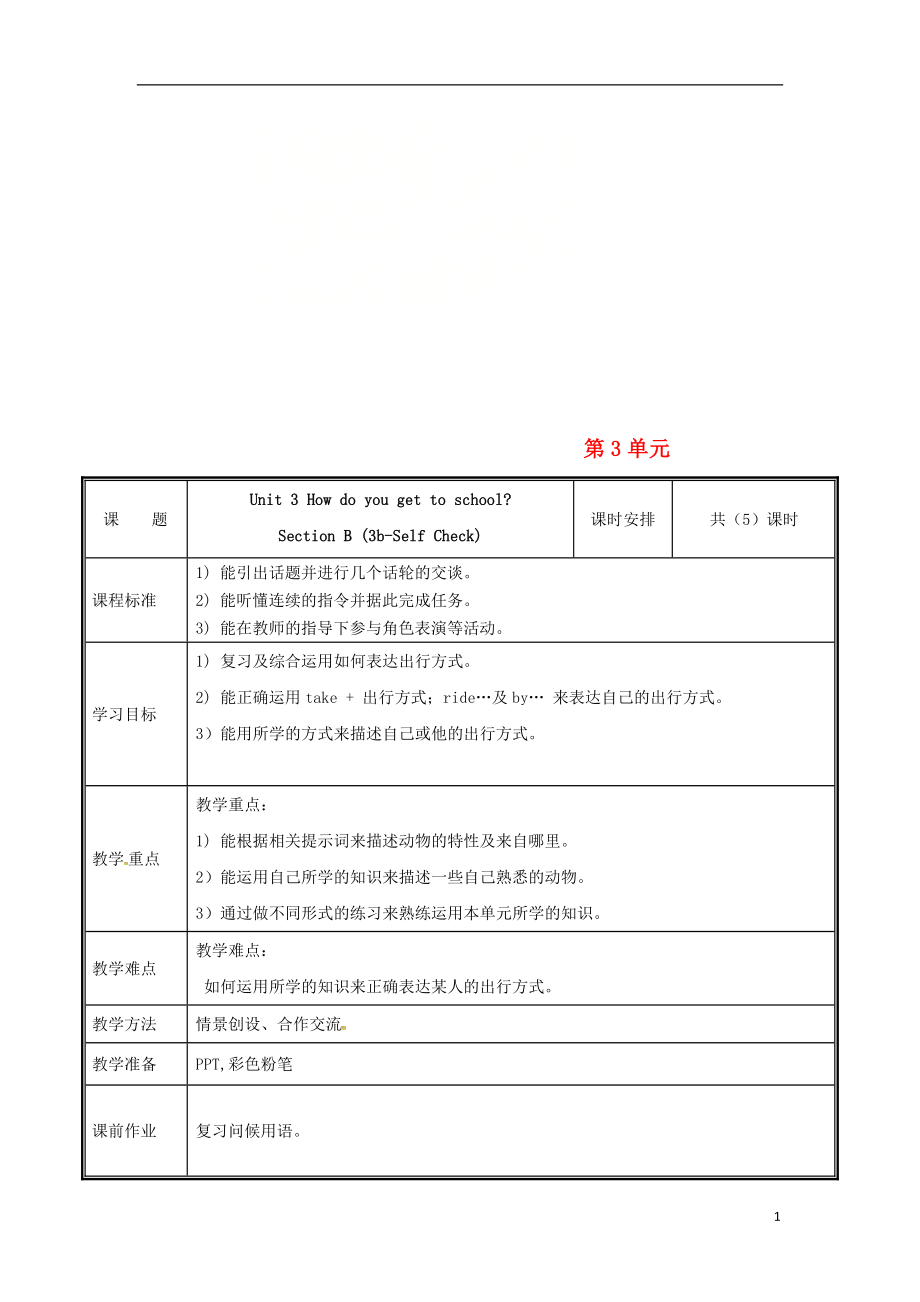《河南省鄭州市中牟縣雁鳴湖鎮(zhèn)七年級英語下冊 Unit 3 How do you get to school(第5課時(shí))教案 (新版)人教新目標(biāo)版》由會員分享�,可在線閱讀,更多相關(guān)《河南省鄭州市中牟縣雁鳴湖鎮(zhèn)七年級英語下冊 Unit 3 How do you get to school(第5課時(shí))教案 (新版)人教新目標(biāo)版(5頁珍藏版)》請?jiān)谘b配圖網(wǎng)上搜索�。
1、
第3單元
2�、
3、
課 題
Unit 3 How do you get to school?
Section B (3b-Self Check)
)
came?
Section A (1)
課時(shí)安排
共(
4�、5)課時(shí)
課程標(biāo)準(zhǔn)
1) 能引出話題并進(jìn)行幾個話輪的交談�。
2) 能聽懂連續(xù)的指令并據(jù)此完成任務(wù)。
3) 能在教師的指導(dǎo)下參與角色表演等活動。
學(xué)習(xí)目標(biāo)
1) 復(fù)習(xí)及綜合運(yùn)用如何表達(dá)出行方式�。
2) 能正確運(yùn)用take + 出行方式�;ride…及by… 來表達(dá)自己的出行方式�。
3)能用所學(xué)的方式來描述自己或他的出行方式�。
教學(xué)重點(diǎn)
教學(xué)重點(diǎn):
1) 能根據(jù)相關(guān)提示詞來描述動物的特性及來自哪里�。
2)能運(yùn)用
5�、自己所學(xué)的知識來描述一些自己熟悉的動物。
3)通過做不同形式的練習(xí)來熟練運(yùn)用本單元所學(xué)的知識。
教學(xué)難點(diǎn)
教學(xué)難點(diǎn):
如何運(yùn)用所學(xué)的知識來正確表達(dá)某人的出行方式�。
教學(xué)方法
情景創(chuàng)設(shè)、合作交流
教學(xué)準(zhǔn)備
PPT,彩色粉筆
課前作業(yè)
復(fù)習(xí)問候用語。
教學(xué)過程
教學(xué)環(huán)節(jié)
課堂合作交流
二次備課
(修改人: )
環(huán)
節(jié)
二
Step 1 Warming- up and revision
1. Greet the Ss as usual.
2. Check the homework and have a dictatio
6�、n of the new words and expressions.
3. Let some Ss retell the passage in 2b.
Step 2 Presentation
1. Using some pictures to show some ways of transportation:
walk, take the bus/train/subway/plane/boat; ride the bike/horse; go/get to sp by bus/train/subway…
讓學(xué)生們理解這幾個詞組的用法�。
2. Make some sente
7�、nces using these phrases.
3. Give some examples of the sentences.
Step 3 Practice
1. Read the e-mail from your pen pal Tom in the US. Fill in the blanks with the words in the box.
閱讀指導(dǎo):首先�,明白方框里單詞的意思;
其次�,閱讀這封e-mail了解大意�;
然后,認(rèn)真讀每一個句子,根據(jù)上下文及空格前后的關(guān)鍵詞來確定空格處的意思�。并確定應(yīng)哪一個單詞填空。
8、 最后�,再通讀一遍短文,看短文是否通順恰當(dāng)。
2. 學(xué)生們按老師所指導(dǎo)的方法�,認(rèn)真閱讀短文�,并用正確的單詞填空�。
3. Check the answers.
Step 4 Writing
In this task, it's our turn to write an e-mail to Tom and tell him how you get to school.
1. First, let's look at these questions below:
(Let one student read the questions aloud. Make s
9、ure all the students know the meaning of the questions.)
2. Work in pairs ask and answer the questions. And write them down on your workbook.
3. Try to write a short e-mail with the help of the sentences you wrote.
4. Check the e-mails with your partners.
5. Let some Ss read the
10�、ir e-mail to the class as a model.
Step 5 Self Check 1
1. We've learned many ways of transportations. Now let's have a short review.
Look at the words in the boxes below to form as many expressions as possible.
2. Ss work in groups and try to write as many expressions as possible:
take
11、a bus, by bus, take a train, by train, take a subway, by subway, ride a bike, by bike….
3. Let some Ss read their answers. Let other students add more phrases.
Note: by + 出行方式(不加the); take(ride) + a (the)出行方式
Step 6 Self Check 2
1. Look at the chart below. Write at least five questions. Then
12�、answer the questions with the information in the chart.
2. 寫作提示:根據(jù)表格提示,應(yīng)有三種類型的問題:出行方式(How); 距離(How far); 所用的時(shí)間 (How long); 對每個人都問這三個問題一次�。然后根據(jù)表格中的提示來回答。
例如:—How does Tony get to school from home?
—He gets to school by bike.
3. 同學(xué)們根據(jù)老師的指導(dǎo)進(jìn)行問答�。將問題與答案寫在練習(xí)本。然后在小內(nèi)交換檢查�。
課中作業(yè)
Self Check
S
13、tep 7 Homework
1. Review all the dialogues and passages in Section B.
2. Write a short e-mail to your pen friend to tell your ways to get to school.
(修改人: )
板書設(shè)計(jì):
Unit 3 How do you get to school?
Section B 3a-Self Check
3a: go, leave, walk, boring
3b: 1. When do you leave ho
14�、me?
2. How do you get to school?
3. How far is it from your home to school?
4. How long does it take you to get to school?
5. Do you like your trip to school?
Self Check 1:
take a bus, by bus, take train, by train, take a subway, by subway, take plane, by plane; ride a bike, by bike, walk, on food
教學(xué)反思:
5
 河南省鄭州市中牟縣雁鳴湖鎮(zhèn)七年級英語下冊 Unit 3 How do you get to school(第5課時(shí))教案 (新版)人教新目標(biāo)版
河南省鄭州市中牟縣雁鳴湖鎮(zhèn)七年級英語下冊 Unit 3 How do you get to school(第5課時(shí))教案 (新版)人教新目標(biāo)版

